Found a total of 377 related content

Oracle Database's Secret Weapon: How to Kill Competitor MySQL?
Article Introduction:Oracle Database’s Secret Weapon: How to Kill Competitor MySQL? In today's information age, big data has become the key to the flourishing development of many enterprises. As the core of enterprise data storage and management, database is not unimportant. As the two relational databases with the highest market share, Oracle database and MySQL database have their own advantages and disadvantages. This article will take the Oracle database as an example to introduce how to use its secret weapon to instantly kill its competitor MySQL. Powerful and stable performance
2023-09-08comment 0978
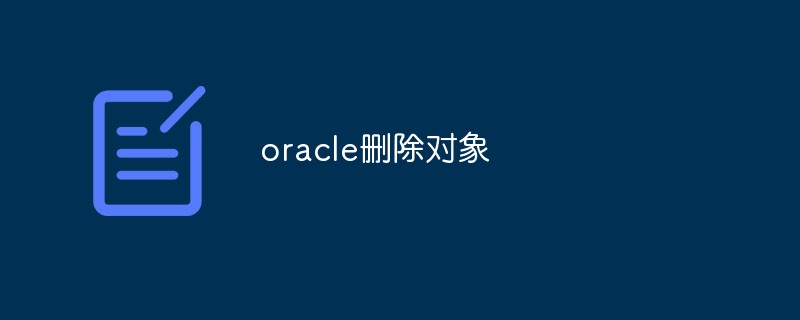
oracle delete object
Article Introduction:Oracle database is an important choice for enterprise-level applications. However, over time, the number of database objects (such as tables, indexes, views, etc.) will continue to increase. Sometimes you may need to delete some unnecessary objects to reduce space usage or reorganize the database structure. This article will introduce how to delete objects in Oracle database. 1. Deleting a table Deleting a table in Oracle is very simple. One or more tables can be easily dropped using the DROP TABLE statement. Below is some sample code. Use the DROP TABLE idiom
2023-05-14comment 0500
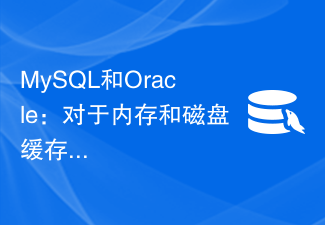
MySQL and Oracle: Comparison of optimization levels for memory and disk cache
Article Introduction:MySQL and Oracle: Comparison of optimization levels of memory and disk cache In database management systems, memory and disk cache are important means to improve performance. MySQL and Oracle are two widely used relational database management systems, and they have some differences in the degree of optimization of memory and disk cache. This article will compare the differences between MySQL and Oracle in this regard and give some code examples. 1. Comparison of memory cache optimization levels MySQL and Oracle both have memory cache mechanisms for
2023-07-12comment 0522

What are the oracle objects?
Article Introduction:Oracle objects include: 1. Table; 2. Index; 3. Cluster; 4. View; 5. Synonym; 6. Sequence; 7. Procedure and Function ); 8. Trigger; 9. Constraints, etc.
2022-02-24comment 05437

MySQL vs. Oracle: feasibility comparison for replication and redundancy
Article Introduction:MySQL and Oracle: Feasibility Comparison of Replication and Redundancy Summary: Database replication and data redundancy are common technical means in modern database management systems. This article will focus on comparing the feasibility of replication and redundancy in two mainstream database management systems, MySQL and Oracle. We will focus on the following aspects for comparison: replication type, redundancy strategy, performance, and reliability. Replication type: MySQL provides a variety of replication types, including master-slave replication, group replication, and ring replication. Master-slave replication is the most common
2023-07-12comment 01110
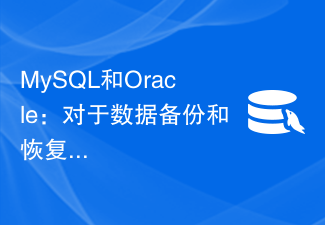
MySQL and Oracle: Reliability comparison of data backup and recovery
Article Introduction:MySQL and Oracle: Reliability comparison for data backup and recovery Summary: MySQL and Oracle are two commonly used relational database management systems. In terms of data backup and recovery, this article will compare the reliability of MySQL and Oracle. First, we will introduce the importance and common methods of data backup and recovery. Then, we will discuss the characteristics of MySQL and Oracle in data backup and recovery. Finally, we will demonstrate MySQL and Or through code examples
2023-07-12comment 0627

MySQL and Oracle: Performance comparison for advanced queries and complex SQL statements
Article Introduction:MySQL and Oracle: Performance comparison for advanced queries and complex SQL statements Introduction: MySQL and Oracle are the two most popular relational database management systems on the market. In practical applications, advanced queries and complex SQL statements are common operational requirements. This article will compare the performance of MySQL and Oracle in processing advanced queries and complex SQL statements, and give corresponding code examples. 1. Query performance comparison of simple queries: First, we compare MySQL and Oracle
2023-07-13comment 01294
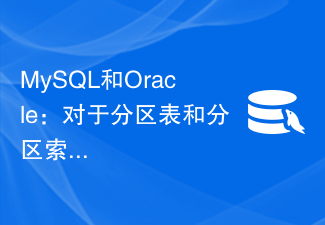
MySQL and Oracle: Comparison of support for partitioned tables and partitioned indexes
Article Introduction:MySQL and Oracle: Comparison of support for partitioned tables and partitioned indexes Introduction: In database management systems, the use of partitioning technology is a common optimization method for databases with large data volumes and high concurrent operations. Partitioning technology can split data into multiple independent partitions, thereby improving query performance and data management efficiency. This article will compare the support of partition tables and partition indexes by MySQL and Oracle, two commonly used relational database management systems, and give corresponding code examples to illustrate. 1. Partition
2023-07-12comment 0925
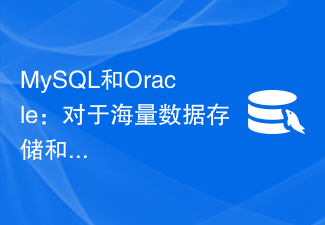
MySQL and Oracle: Comparison of support for massive data storage and access
Article Introduction:MySQL and Oracle: Comparison of support for massive data storage and access In today's big data era, the demand for massive data storage and access is growing day by day. MySQL and Oracle are two highly respected relational database management systems (RDBMS), which have certain differences in the storage and access of massive data. This article will explore the comparison of support between MySQL and Oracle in this area, and provide code examples to illustrate it. 1. Storage capacity and performance MySQL and Oracle have storage capacity
2023-07-13comment 0700

MySQL vs. Oracle: Comparison of multi-language and internationalization support
Article Introduction:MySQL and Oracle: Comparison of multi-language and internationalization support With the advancement of globalization, multi-language and internationalization have become issues that cannot be ignored in software development. In the database field, MySQL and Oracle are the two main relational database management systems (RDBMS). They have different characteristics and implementation methods in terms of multi-language and international support. This article will compare the multi-language and internationalization support of MySQL and Oracle, and introduce some sample code to illustrate its usage.
2023-07-12comment 01074
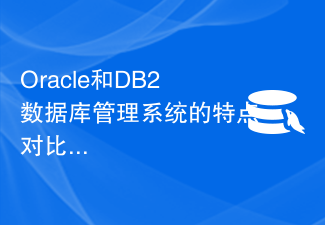
Comparison of features between Oracle and DB2 database management systems
Article Introduction:Oracle and DB2 are two common relational database management systems, each with their own unique characteristics and advantages. This article will compare the characteristics of Oracle and DB2, and provide specific code examples to illustrate the differences between them. 1. Characteristics of Oracle database management system: Storage engine: Oracle database uses its own unique storage engine, called Oracle Database Engine (OracleDatabaseEngine), which can handle large-scale data storage.
2024-03-11comment 0643

MySQL and Oracle: Comparison of support for XML data processing
Article Introduction:MySQL and Oracle: Comparison of Support for XML Data Processing Introduction: In today's era of data processing, XML (Extensible Markup Language), as a common data exchange format, is widely used in various fields. Among relational database management systems (RDBMS), MySQL and Oracle are the two most popular choices. This article will compare the support levels of MySQL and Oracle in processing XML data, and explain the differences in detail through code examples. 1. XM
2023-07-12comment 01113

MySQL and Oracle: Comparison of tools for database performance monitoring and tuning
Article Introduction:MySQL and Oracle: A comparative overview of tools for database performance monitoring and tuning: MySQL and Oracle are both widely used relational database management systems. In practical applications, how to monitor and tune the database is the key to improving database performance. This article will introduce commonly used performance monitoring and tuning tools in MySQL and Oracle, and compare the two. MySQL performance monitoring and tuning tool: MySQL Performance Monitor (MySQLPerformance
2023-07-12comment 0772
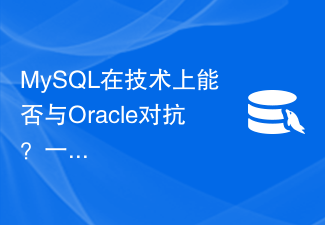
Can MySQL technically compete with Oracle? check it out!
Article Introduction:Can MySQL technically compete with Oracle? check it out! With the advent of the digital age, enterprises have increasing demands for database systems to meet the storage of massive data, efficient data processing and reliable data protection. For database systems, MySQL and Oracle have always been the two most popular and powerful competitors on the market. So, can MySQL technically compete with Oracle? This article will conduct a comparative analysis of the technical characteristics of MySQL and Oracle.
2023-09-11comment 01001
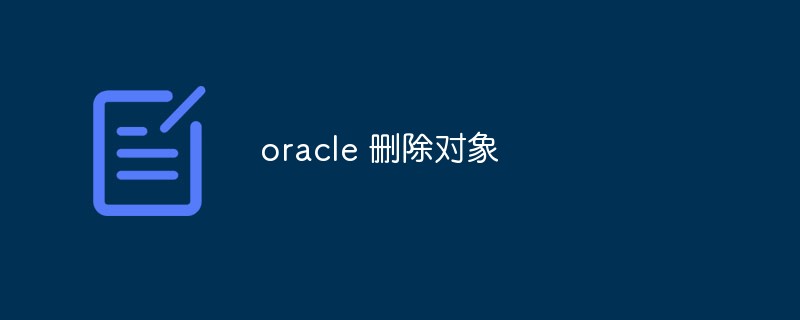
Discuss methods and techniques for deleting objects in Oracle
Article Introduction:Oracle is a popular database management system that provides users with very powerful data management and query capabilities. When using Oracle, users often need to delete database objects, such as tables, indexes, constraints, etc. In this article, we will explore the methods and techniques of deleting objects in Oracle. I. Dropping a table Dropping a table is one of the most basic operations in Oracle. A table can be deleted through the following SQL statement: ```DROP TABLE table_name;```This statement will delete t immediately
2023-04-21comment 0350
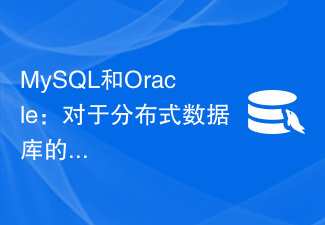
MySQL and Oracle: Comparison of support for distributed databases
Article Introduction:MySQL and Oracle: Comparison of support for distributed databases Introduction: With the continuous growth of data volume and changing business needs, more and more enterprises are turning to distributed databases to meet their large-scale data storage and processing needs. need. Among many distributed databases, MySQL and Oracle are popular choices that have attracted much attention. This article will compare MySQL and Oracle's support for distributed databases and provide corresponding code examples. 1. MySQL distributed data
2023-07-12comment 01026
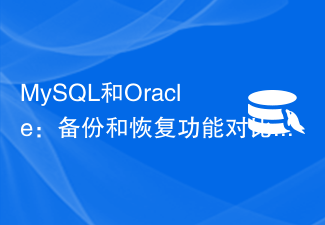
MySQL vs. Oracle: Backup and Recovery Features Comparison
Article Introduction:MySQL and Oracle: Comparison of Backup and Recovery Functions Introduction: MySQL and Oracle are two commonly used relational database management systems. They have their own characteristics and advantages in backup and recovery functions. This article will compare the backup and recovery functions of MySQL and Oracle and provide corresponding code examples. 1. MySQL backup and recovery functions 1.1 Database backup MySQL provides a variety of ways to back up the database, the most common of which is to use mysqldu
2023-07-12comment 0950
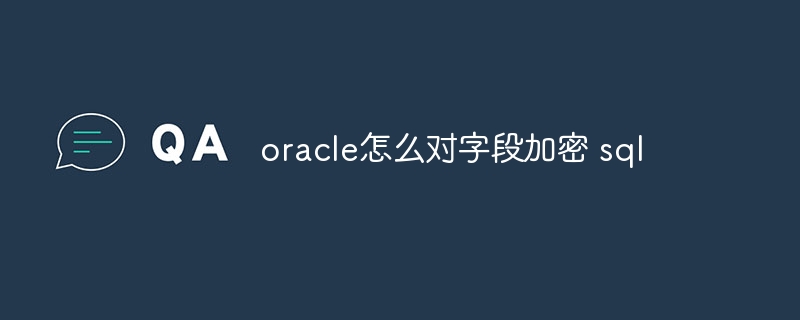
How to encrypt fields in oracle sql
Article Introduction:Oracle provides two methods of field encryption: Row-based encryption: Encrypts the entire row of data using AES. Column-based encryption: Encrypt specific columns using AES or RSA.
2024-04-02comment 0882
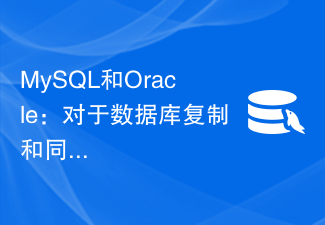
MySQL and Oracle: Comparison of database replication and synchronization functions
Article Introduction:MySQL and Oracle: Comparison of database replication and synchronization functions [Introduction] In today's information age, data, as one of the important resources of enterprises and organizations, has attracted more and more attention. The replication and synchronization functions of the database are widely used in data backup, load balancing, disaster recovery, and synchronization of multiple data centers. As two mainstream relational database management systems, MySQL and Oracle have their own advantages and characteristics in database replication and synchronization. This article will focus on MySQL and Oracle
2023-07-13comment 0403

Strategies for dealing with exceptions in Oracle listening servers
Article Introduction:Oracle database is a leader among enterprise-level database systems, and its stability and performance have always been recognized by the industry. Oracle listening server (Listener) plays a vital role as the interactive link between Oracle database and client applications. However, sometimes exceptions may occur in the Listener, which may cause the database to be unable to connect normally and have a serious impact on the business system. Therefore, the response strategy for Oracle monitoring server exceptions is crucial. one
2024-03-07comment 0496



















